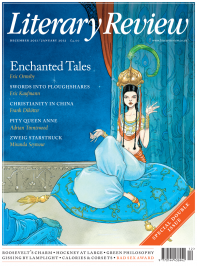Sophia Waugh
Food, Glorious Food
Clarissa Dickson Wright’s A History of English Food is, in almost equal measure, enraging and engaging. Engaging because it is so full of interesting facts and old recipes, all related in Dickson Wright’s resonant, no-nonsense manner and suffused with her love for food. Enraging partly for the same reasons: it is called a history, but the tone is sometimes irritatingly non-historical. No historian would put themselves into a book as much as Dickson Wright does here, let alone come up quite so often with theories based on nothing but her own Columbo-like hunches. (‘I can’t help wondering’ and ‘how different history might have been’ are endless refrains.) Sometimes she is so goofy that the reader doesn’t know whether to weep or bellow with laughter. The sentence ‘I can’t imagine any of the guests that day could have guessed that in less than twenty years the Battle of Bosworth would see the end of the Middle Ages’ has shades of Python’s ‘let us go forth and fight the Hundred Years War’.
She starts in 1154, with the accession of Henry II, and then progresses chronologically, linking the food people ate with wider social history. We follow the English from their earliest dishes (bacon and eggs, of course) through the changes that came about from outside influence: the Crusaders brought back spices;

Sign Up to our newsletter
Receive free articles, highlights from the archive, news, details of prizes, and much more.@Lit_Review
Follow Literary Review on Twitter
Twitter Feed
Alfred, Lord Tennyson is practically a byword for old-fashioned Victorian grandeur, rarely pictured without a cravat and a serious beard.
Seamus Perry tries to picture him as a younger man.
Seamus Perry - Before the Beard
Seamus Perry: Before the Beard - The Boundless Deep: Young Tennyson, Science, and the Crisis of Belief by Richard Holmes
literaryreview.co.uk
Novelist Muriel Spark had a tongue that could produce both sugar and poison. It’s no surprise, then, that her letters make for a brilliant read.
@claire_harman considers some of the most entertaining.
Claire Harman - Fighting Words
Claire Harman: Fighting Words - The Letters of Muriel Spark, Volume 1: 1944-1963 by Dan Gunn
literaryreview.co.uk
Of all the articles I’ve published in recent years, this is *by far* my favourite.
✍️ On childhood, memory, and the sea - for @Lit_Review :
https://literaryreview.co.uk/flotsam-and-jetsam